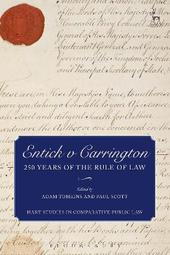
|
Entick v Carrington: 250 Years of the Rule of Law
Hardback
Main Details
| Title |
Entick v Carrington: 250 Years of the Rule of Law
|
| Authors and Contributors |
Edited by Adam Tomkins
|
|
Edited by Paul F Scott
|
| Series | Hart Studies in Comparative Public Law |
|---|
| Physical Properties |
| Format:Hardback | | Pages:288 | | Dimensions(mm): Height 234,Width 156 |
|
| ISBN/Barcode |
9781849465588
|
| Classifications | Dewey:342.41 |
|---|
| Audience | | Professional & Vocational | | Postgraduate, Research & Scholarly | |
|---|
|
Publishing Details |
| Publisher |
Bloomsbury Publishing PLC
|
| Imprint |
Hart Publishing
|
| Publication Date |
24 September 2015 |
| Publication Country |
United Kingdom
|
Description
Entick v Carrington is one of the canons of English public law and in 2015 it is 250 years old. In 1762 the Earl of Halifax, one of His Majesty's Principal Secretaries of State, despatched Nathan Carrington and three other of the King's messengers to John Entick's house in Stepney. They broke into his house, seizing his papers and causing significant damage. Why? Because he was said to have written seditious papers published in the Monitor. Entick sued Carrington and the other messengers for trespass. The defendants argued that the Earl of Halifax had given them legal authority to act as they had. Lord Camden ruled firmly in Entick's favour, holding that the warrant of a Secretary of State could not render lawful actions such as these which were otherwise unlawful. The case is a canonical statement of the common law's commitment to the constitutional principle of the rule of law. In this collection, leading public lawyers reflect on the history of the case, the enduring importance of the legal principles for which it stands, and the broader implications of Entick v Carrington 250 years on. Winner of the American Society for Legal History Sutherland Prize 2016.
Author Biography
Adam Tomkins is the John Millar Professor of Public Law at the University of Glasgow. Paul Scott is a Lecturer in Public Law at the University of Southampton.
ReviewsFor anyone with an interest in Rule of Law ideas, the addition - or even heightened prevalence - of Entick on the Rule of Law radar that follows from a review of the book is of real benefit. -- Paul Burgess * Jus Politicum * We are still living in the in the age of Entick v.Carrington. We are also grimly contemplating Lord Camden's parting observation: 'Tyranny is better than anarchy, and the worst government better than none at all'. -- Stephen Sedley * London Review of Books *
|